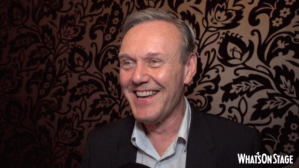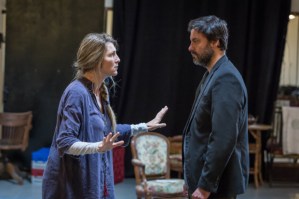Review: A Woman of No Importance (Vaudeville Theatre)
Eve Best stars in Oscar Wilde’s comedy, revived by Dominic Dromgoole in his Wilde season in the West End
Apart from the ubiquitous The Importance of Being Earnest, nowadays we quote Oscar Wilde and mull over the meaning of his life, far more than we watch his plays.
This revival of A Woman of No Importance, which launches Dominic Dromgoole‘s Wilde season, performed by his new Classic Theatre Company, to a large extent explains why. It is a bit like being transported back to 1893, when the play was first performed.
On Jonathan Fensom‘s handsome set, and in corseted silk, a group of well-born people sit around and exchange witticisms about the state of things. In the mouths of actors such as Eleanor Bron, Anne Reid, Emma Fielding and Sam Cox, the words fly around happily and it’s all quite amusing if a little arch. But it does go on, slightly aimlessly, for nearly two acts.
And then Eve Best’s Mrs Arbuthnot arrives and her passion explodes the play. In part this is Wilde’s intention. Rachel Arbuthnot is a woman wronged; she has lived in seclusion and brought up her son alone, when her lover – on the advice of his own mother – refused to marry her. Unexpectedly she encounters him here in the shape of Lord Illingworth, another guest. To complicate matters further, he has just unknowingly offered their son Gerald a job, which his mother is determined he will not take.
Should she tell her son the truth and risk being judged? Or should she stay silent? Wilde’s concern is the double standards that allow Illingworth to be described (by the deliciously silly Lady Stutfield, who never uses a single adverb when two will do) as "very, very wicked" and be entirely accepted by society, while Rachel has had to withdraw from it and is shamed in the eyes of the world. The problem, I think, is that Wilde is half in love with Illingworth too – certainly he gives him many of the best lines including the famous "Women love us for our defects. If we have enough of them, they will forgive us everything, even our gigantic intellects".
This means the play in its second half swings from drawing room comedy to melodrama, and is sometimes both at once. Dromgoole’s direction doesn’t so much cope with these transitions of mood and feeling as run rapidly over them, and he has complicated things further by using a version of the text that emphasises its social comment at the expense of its humour. The cleverly chosen entr’acte parlour songs, brilliantly performed in front of the curtain, are a pleasure but introduce a further difficulty of tone.
Nevertheless, by the close, for all its oddities, both play and production just about have you in the palm of their hand. I had some difficulty with Dominic Rowan‘s Illingworth; he doesn’t ever quite manage to climb over the aphorisms and make them sound like thought. Crystal Clarke struggles to breathe any kind of life into the priggish Puritanical heiress who is the plot’s unlikely saviour.
But the rest of the cast are excellent with Fielding finding details of feeling as well of fun in the flirtatious Mrs Allenby and Harry Lister Smith catching just the right mix of irritating moralism and wounded feeling as Gerald. (The moment when he hides his confusion beneath a chair is one of the most touching in the entire evening.)
As Lady Hunstanton, Reid gives a masterclass in timing and finding a naturalism in Wilde’s most biting lines. As for Best, she is quite simply one of the best actresses we have at the moment and should be feted with roses. She conveys Rachel’s honesty, tenacity and difference with subtlety and profound feeling.
When she tells her son, "I can never repent. I would rather be your mother than pure", she finds the heart of Wilde’s complex, kindly morality. Words and emotion come together in ways that make you suddenly see his genius.
A Woman of No Importance runs at the Vaudeville Theatre until 30 December.














